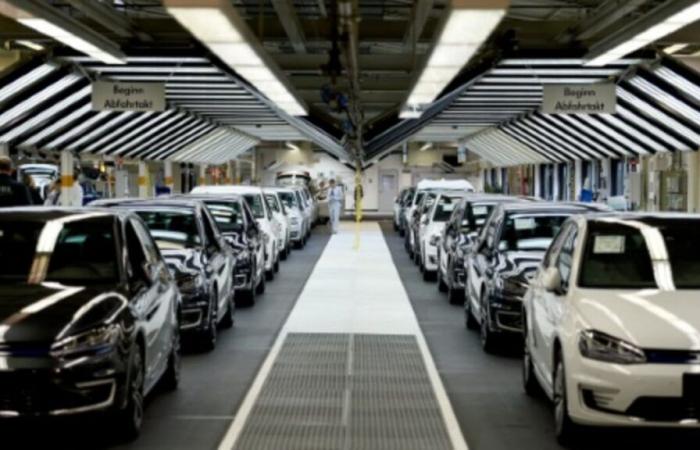Europe's leading carmaker Volkswagen will cut more than 35,000 jobs in Germany by 2030 in order to reduce costs, while avoiding factory closures and layoffs as part of an agreement sealed on Friday to try to save the group in crisis.
Management and the union showed their relief at this compromise, which was concluded with forceps after three months of tense negotiations, punctuated by two strikes which brought the group's sites to a standstill.
The agreement provides for “a socially acceptable reduction in the workforce” of more than 35,000 people on the German sites of the Volkswagen brand by 2030, or 29% of its total workforce, announced the manufacturer, flagship of German industry .
No forced departures
These departures will not be forced, staff representatives stressed. Many retirements, in particular, will not be replaced. The formula found “guarantees jobs, preserves production in factories and at the same time allows significant future investments,” said Thorsten Gröger, negotiator for the automobile union. “There will be no factory closure, economic layoffs are excluded,” he assured while this scenario was not excluded by the leading European manufacturer.
According to the unions, management initially demanded the elimination of 55,000 jobs. In exchange, employees agreed to waive a certain number of bonuses and reduce production capacity in several of the group's ten German factories, which will be reduced by more than 700,000 units.
The Golf will be produced in Mexico from 2027
They are also sacrificing a minor site: the Dresden factory (east), which employs around 340 people, will no longer produce cars after the end of 2025. And a symbol: the iconic Golf will be produced in Mexico from 2027, and more in the cradle of the group, in Wolfsburg (north).
Thanks to this agreement, Volkswagen hopes to generate a total of “4 billion euros” in savings in the medium term. “We had three priorities: reducing overcapacity at German sites, reducing labor costs and bringing development costs to a competitive level,” explained Thomas Schäfer, head of the group's flagship brand, VW, also the most in difficulty. “We have reached viable solutions on these three subjects,” he assured.
The group, the flagship of German industry, caused a shock in September by announcing that it was preparing a drastic savings plan to restore its flagging competitiveness and was considering factory closures – a first in the history of Volkswagen. CEO Oliver Blume continues to insist that the manufacturer's costs are too high and the profit margins of the historic VW brand, which represents a little more than half of sales, too low.
An issue before the early legislative elections
Volkswagen is also suffering from the global slowdown in car sales, Chinese competition, and battery models that are not attractive enough which are slowing down the momentum of its transition to electric.
The two parties have been negotiating almost continuously since Monday to reach an agreement before the end of the year. The white smoke finally came Friday evening, “after one of the longest and most intense negotiations in the history of IG Metall,” according to the union.
Beyond the employees, the whole of Germany was awaiting the verdict from the country's largest industrial employer. Sabine Timpe, employed in a VW services subsidiary, told AFP that she was “terrified” by the current crisis. The crisis at Volkswagen is also a central issue in the campaign for the early legislative elections on February 23 in Germany.
Social Democratic Chancellor Olaf Scholz, who is fighting for a second term despite his unpopularity, took up the cause of the employees because “bad management decisions contributed to the situation”.
For the conservatives, leading the polls, the crisis at Volkswagen worsens the economic record of the outgoing government, in a country which will post a second annual recession in a row and where German industry is faced with cascading social plans.






